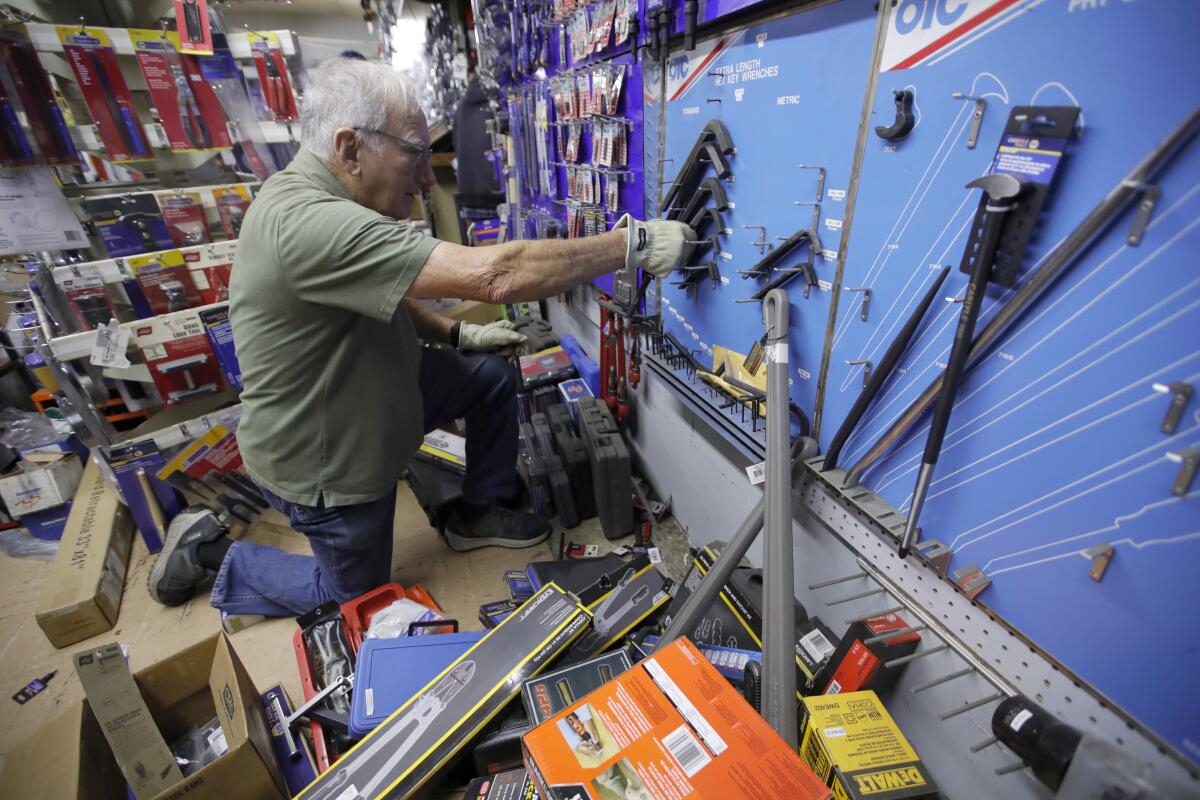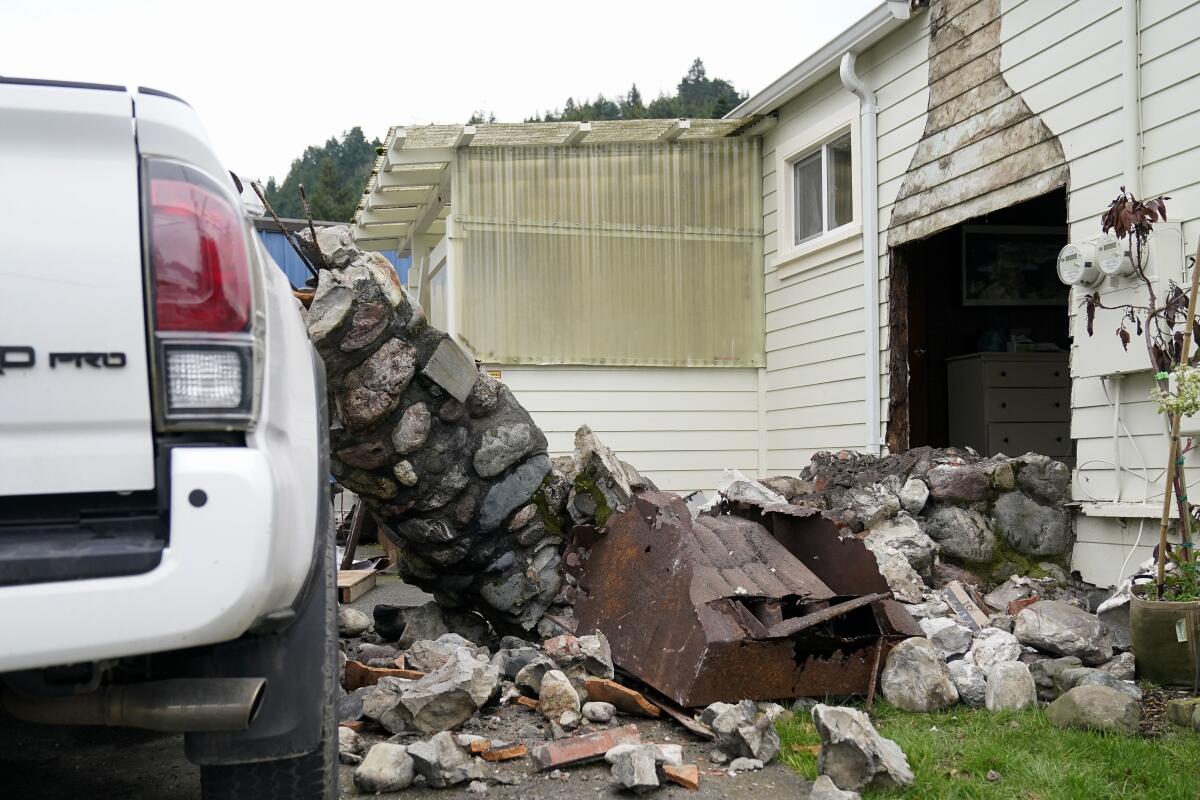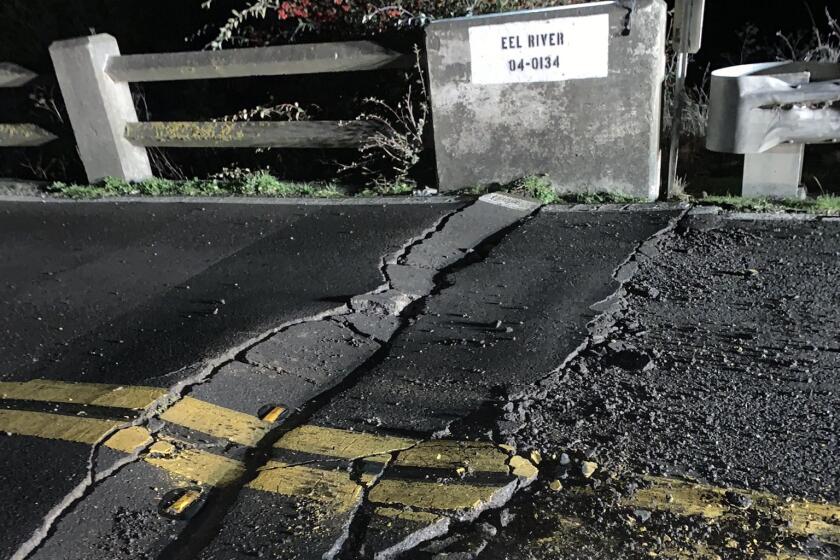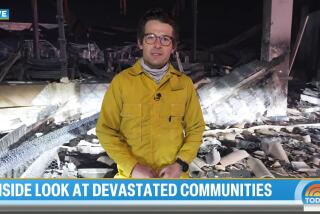Destruction, tears and tenacity in California towns battered by earthquake

- Share via
RIO DELL, Calif. — Combing their homes with flashlights in the darkness, residents of the rural communities of the Eel River Valley could only sense what damage Tuesday’s earthquake had brought to their lives five days before Christmas.
Homes littered with shards of glass. Framed pictures broken on the floor. Cups and keepsakes in pieces beside them. Bookshelves and kitchen cabinets emptied.
By first light though, the devastation became apparent. Front porches had collapsed. A building caught fire. The beloved, multi-arched Fernbridge, a 1911 Humboldt County landmark and veteran of past earthquakes and floods — its guardrails bent, evidence of the fierce shaking — was closed by the California Department of Transportation.
More than 70,000 residents were without power at one point. Estimates placed the number of households who had lost their homes or were waiting to know their fate at 150. The local water system was wrecked. “So many leaks,” said Debra Garnes, mayor of Rio Dell, a small town on the banks of the Eel River.
More than 3 million people were notified by phone early Tuesday of a 6.4 magnitude earthquake that shook Northern California.
The Humboldt County sheriff reported two people killed and 11 injured.
Striking at 2:34 a.m., the 6.4 magnitude earthquake was yet again a reminder of the forces that have shaped California for millenniums — and the price that comes with living on the edge of the continent.
By late afternoon, a sense of resignation had settled over the Redwood-surrounded towns on this narrow floodplain, just a few miles from the ocean.

Deborah Dobereiner, who lives with her daughter and son-in-law at Fosters Mobile Home Park, took refuge in the fire station. The earthquake was so powerful, she said, it snapped the straps that secured their home to the ground and moved it an estimated three feet.
“We’re not even thinking long term right now,” she said, uncertain where she and her family would sleep that night. “We’re just hoping like hell that we can still live there.”
Nearly a dozen families were seeking temporary shelter, according to the Rio Dell Fire Department.
As aftershocks kept everyone on edge, residents started cleaning up with a mixture of resilience and tenacity. Many Humboldt County residents headed to Eureka to pick up supplies at Costco, which was being powered by a generator and had been open since 3:30 a.m.
The strip malls along Highway 101 were dark. Parking lots for Old Navy, Bed, Bath & Beyond and Chipotle, typically jammed with holiday customers, were empty.
No stranger to hardship in an economy sustained mostly by its dairy and timber industry, residents are accustomed to relying on one another, even if through tears and occasional laughter.
A 6.4 earthquake near Ferndale has resulted in at least two deaths from medical emergencies, 11 injuries and extensive damage.
Debbie Chisum, owner of the Double D Steak and Seafood in neighboring Fortuna, oversaw staff and volunteers sweeping up broken bottles of wine and spirits, joking how the place smelled of a New Year’s party gone bad. Weeks of preparation for the holidays lay in ruin, like her Christmas tree leaning on the ground.
Having lived through earthquakes before, Chisum was accustomed to their power. “They are so noisy, and all your stuff is flying out of the cupboards and hitting the floor,” she said. “Your house feels like it’s going to fall down.”
But this one was different, she said.
“Honestly, I was just in tears,” she added, describing her reaction in the immediate aftermath of the temblor.
In the town that residents call the Friendly City, wooden boards soon covered broken windows, and business owners were busy sweeping up glass.
When Heather Herrick, owner of the Haute Hoarder boutique, checked on the status of her vintage store on Main Street, she was touched to see that the shop’s broken windows had already been covered.
A good Samaritan, she said.
Earthquakes
More resources
— One of the most important things you can do to prepare for an earthquake is talk to your neighbors, writes seismologist Lucy Jones.
— Thinking of buying a premade earthquake kit? We unboxed four of them, from $30 to $300.
— If all you have to eat in your emergency kit are granola bars and canned tuna, here’s how to up your game. Plus here’s some advice from L.A. food people.
— How does California’s earthquake early-warning system work? And what apps should you have on your phone?
In Rio Dell, bottled water was being handed out at the local Fire Department. A librarian was reorganizing the hundreds of books fallen from the stacks, littering the floor. A boutique hotel in Scotia opened its doors for the displaced, and neighbors consoled one another over yellow caution tape.
Retired firefighter Jose Beltran, now a member of the volunteer fire department, handed out bananas and pastries while problem-solving for locals needing a hotel room or charging stations for medical equipment, like dialysis machines.
“I knew that we were going to be needed,” he said.
His home looked as if someone had picked it up and thrown it back down, he said, leaving the inside looking like a messy “yard sale.” Not long after the initial shock, he checked on his neighbors, making sure there were no gas leaks.
His main concern, however, was his son, who is in a wheelchair with cerebral palsy. “I couldn’t get into his room right away,” Beltran said.
Theresa Adams recalled watching the walls of her house shake and thinking it was not going to stop. “It was terrible,” she said, describing how afterward she lit a few candles once she found a flashlight.
She then went to check on her 80-year-old neighbor, who uses a wheelchair. He was all right.
As night fell, Rio Dell grew quiet, cloaked in a darkness deeper than usual. Temperatures began to drop into the low 50s.
Still worried about the fate of her mobile home, Dobereiner and her family had found a hotel room. When she heard she had a place to spend the night, she started to cry. Her daughter’s boss was going to pay for it.
“We would not be able to do that on our own right now,” she said.
Mays and Rust reported from Humboldt County, and Curwen from Los Angeles.
More to Read
Sign up for Essential California
The most important California stories and recommendations in your inbox every morning.
You may occasionally receive promotional content from the Los Angeles Times.















